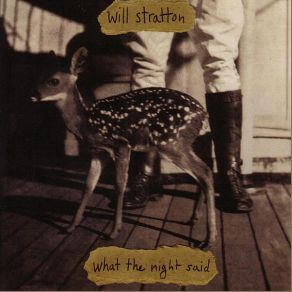What the Night Said
Download links and information about What the Night Said by Will Stratton. This album was released in 2007 and it belongs to Rock, Indie Rock, Pop, Alternative, Songwriter/Lyricist genres. It contains 12 tracks with total duration of 33:28 minutes.

|
|
|---|---|
| Artist: | Will Stratton |
| Release date: | 2007 |
| Genre: | Rock, Indie Rock, Pop, Alternative, Songwriter/Lyricist |
| Tracks: | 12 |
| Duration: | 33:28 |
| Buy it NOW at: | |
| Buy on iTunes $9.99 | |
| Buy on Amazon $8.99 | |
Tracks
[Edit]| No. | Title | Length |
|---|---|---|
| 1. | Katydid | 2:32 |
| 2. | So Ashamed | 3:01 |
| 3. | Fireflies | 2:48 |
| 4. | Night Will Come | 3:45 |
| 5. | Lost the Fear | 2:51 |
| 6. | I'd Hate to Leave You | 2:58 |
| 7. | Sonnet | 2:20 |
| 8. | Oh Quiet Night | 2:19 |
| 9. | Sleepwalk | 1:59 |
| 10. | Stay Awake | 2:55 |
| 11. | Sunol | 2:53 |
| 12. | I Don't Wanna Love | 3:07 |
Details
[Edit]The desire to approximate what Nick Drake did on Pink Moon and apply it to one's own circumstances or era has bedeviled a couple of generations of artists. (So much so that a Drake comparison itself has developed the weight of cliché, yet somehow we all know that such a comparison is aimed primarily at Pink Moon and not at his lushly produced, earlier albums.) Will Stratton does not sound like Drake (so much), but Stratton has produced something stirring and hyper-personal yet universally beautiful on What the Night Said. And Pink Moon is the paragon of that achievement, so it is evoked here to foster understanding for a remarkable album, since most singer/songwriters fall far from that mark while chasing that comet tail in their bedrooms. That Stratton was barely out of his teens at the time of this album's recording (while a student at Bennington College in Vermont), makes it all that more remarkable. "Katydid" is a track of pure alchemy, dotted with bright piano notes, cello, and harpsichord, with Stratton's completely guileless, smooth, and breathy vocals tracked so closely as to sound like they're being poured in the listener's ear. "Sunol" does actually sound like a Pink Moon track, particularly in the wheeling rounds of finger plucked acoustic guitar (with heavily thumbed bass notes), but it is only a reference point, and Stratton's breathy close-mic vocal style is at its best on this track. What really defines this album, though, is the lushness of Stratton's vision, poetically and musically. Even though his songs seem to come from a nearly monkish vantage point of isolation, there is lifting beauty here, a need for connection, and breathtaking flights, swoops, and turns of melody. From Mark Kozelek to Mojave 3 to Damon & Naomi, so many accomplished artists have effectively set off after this precarious balance of levity and gravity; on this album Stratton ranks with the absolute best.